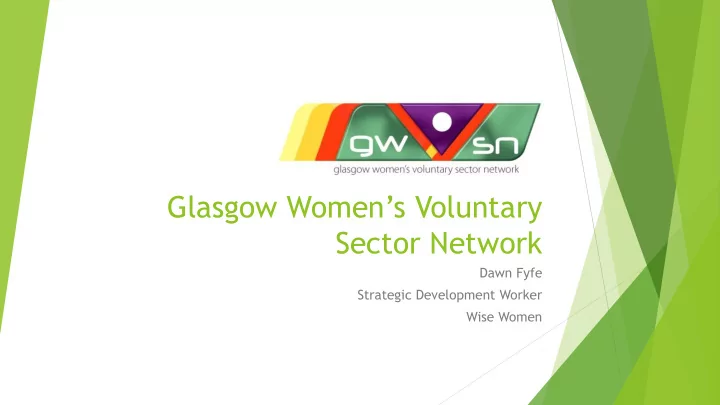

Glasgow Women’s Voluntary Sector Network Dawn Fyfe Strategic Development Worker Wise Women
Objectives Provide a mechanism for identifying gaps in information and services to women in Glasgow. Seek to influence the policy and practice of Glasgow City Council and other appropriate bodies delivering services to women in Glasgow. Monitor the Council’s and other appropriate bodies’ progress on women’s issues. Consult on relevant issues and act as a point of contact for external consultations. Promote anti-discriminatory practice and advocate for such practice to be the norm by challenging racism, homophobia and disablism by proactively working to end violence and discrimination towards black women, lesbians and disabled women and by drawing connections between different types of discrimination (e.g. sexism, racism, homophobia, disablism and classism). Act as a united voice for women’s organisations and organisations that provide a service to women. Monitor and evaluate the funding and resource allocation to women’s organisations that provide a service to women in Glasgow.
Work so far Visit to Participation and the Practice of Rights Belfast (PPR) Recruitment of Women Human Rights Training for Women Induction Training for Women IT skills training Delivery of Women’s Rights are Human Rights session for workers
Models of Work Community Development Approach “… fundamentally based on the values of human rights, social • justice, equality and respect for diversity .” Participation and Practice of Rights (Belfast) “..identifies those responsible for fulfilling rights commitments • and seeks to hold those in power (duty bearers) to account through community- led monitoring process.” Marshall, et al (2014) Citizens Assemblies “… a form of deliberative democracy – a process in which ordinary • people make political decisions.” ( Extinction Rebellion)
Citizen’s Assemblies Independent from Government Transparency Inclusion Access Balance Cumulative Learning Open-mindedness
Strengths The process can be high profile and provide a good way of drawing attention to an issue Can bring out diverse perspectives on complex and contested problems Decision makers brought face-to-face with citizens or those with lived experience of an issue Learning phase and deliberation with peers can help participants to understand, change and develop their opinions; Offers policy makers an insight on public opinion on a contested issue based on the public having access to thorough and unbiased information and time for deliberation
Weaknesses Gaining a broadly representative group of people can be challenging and expensive The process for developing and planning an assembly is intensive and demanding on human and time resource Running a citizens’ assembly is a highly complex process requiring significant expertise There is a danger of being seen as a publicity exercise if not followed by real outcomes
Future plans Visiting parliaments Distribution of Open Space findings Continuation of Open Space and Workers Information Sessions Annual General Meeting Development of consultation model based on Human Rights Framework Delivery of Activate Course 2021 conference
Recommend
More recommend